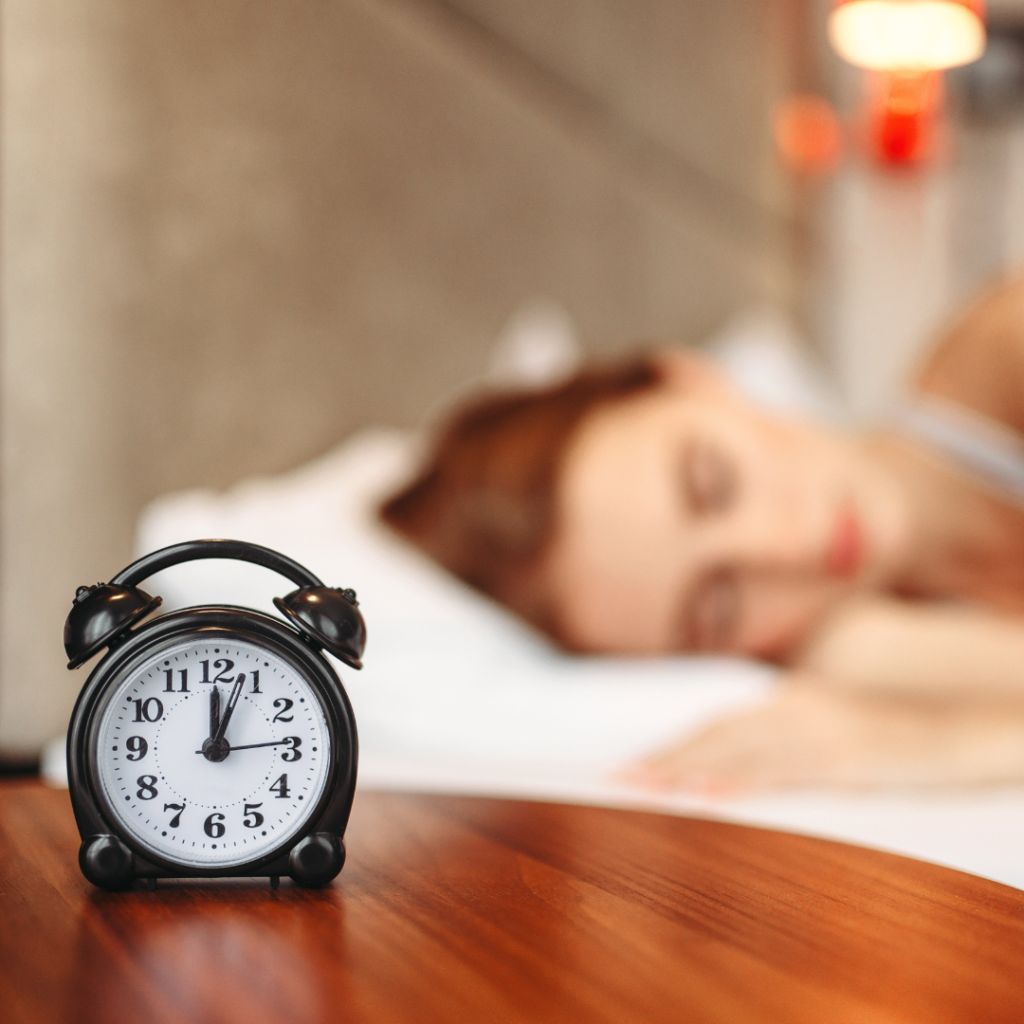What secrets to better sleep in menopause? Explore the impact, causes, and solutions for Insomnia. In this article, we will delve into the complexities of this experience, examining the reasons behind changes in sleep patterns and highlighting the adverse consequences of sleep deprivation during menopause. Furthermore, we will provide practical guidance to enhance sleep quality during this crucial period.
Sleep Struggles in Menopause: Overcoming Insomnia, Hot Flashes, and More
In addition to hormonal changes, menopause can present various challenges that impact sleep quality. Some of these challenges include:
Vasomotor Symptoms
During menopause, many women experience episodes of insomnia, characterized by difficulty falling asleep or maintaining uninterrupted sleep. This condition is often associated with symptoms such as hot flashes, also known as hot flashes. These moments of intense heat can occur during the night, interrupting peaceful sleep and causing significant discomfort. Therefore, the combination of insomnia and hot flashes during menopause can negatively impact sleep quality and general well-being.
Night Sweats
Excessive sweating, linked to hot flashes, can lead to episodes of night sweats, making individuals uncomfortable and waking them during the night.
Changes in Skin Texture and Temperature
Hormonal shifts can affect the skin, making it more sensitive. This, in turn, can make contact with bed linens uncomfortable, impacting sleep.
Urinary Issues
Besides nighttime bathroom visits, some menopausal women may experience problems like urinary incontinence, leading to frequent sleep interruptions.
Changes in Body Composition
Shifts in body fat distribution may lead to snoring and sleep apnea, contributing to respiratory disturbances during sleep.
Psychological Changes
Menopause can trigger psychological changes like stress, anxiety, and depression, which, in turn, affect sleep quality.
Sleep-Related Anxiety
Fear of insomnia or concerns about sleep can develop, creating an adverse cycle that further hampers sleep quality.
Sleep and Menopause: Unraveling the Impact on Circadian Rhythm and Insomnia
Matthew Walker explains in his book that hormonal changes impact the circadian rhythm. During menopause, understanding why the sleep pattern changes is crucial for developing effective strategies.
The circadian rhythm is an approximately 24-hour biological cycle that regulates various physiological processes, including sleep and wakefulness. This rhythm is influenced by external factors such as exposure to light and darkness, as well as internal factors like hormone release.
When hormonal levels, especially estrogen and progesterone, change during menopause, this complex interaction can lead to a disruption in the natural cycle of sleep and wakefulness. The decrease in these hormones can affect sleep regulation in various ways, contributing to challenges like insomnia and other sleep disorders. This imbalance in the circadian rhythm can result in inconsistent sleep patterns and difficulties maintaining a healthy sleep routine during menopause.
Effects on Sleep Regulation
Estrogen plays a crucial role in sleep regulation. Its decrease can lead to sleep disturbances, such as difficulties falling asleep, maintaining sleep, and waking up too early.
Fluctuations in Body Temperature
The circadian rhythm is closely tied to natural fluctuations in body temperature. During menopause, nighttime hot flashes, caused by hormonal instability, can interfere with this cycle, making it difficult to fall asleep and maintain uninterrupted sleep.
Melatonin Production
Melatonin, the sleep hormone, is produced in response to darkness and helps induce sleep. Changes in hormonal levels can affect melatonin production, impacting sleep quality.
Changes in Sleepiness Patterns
Hormonal changes can lead to alterations in the pattern of sleepiness throughout the day. For instance, some menopausal women may experience daytime drowsiness due to poorly slept nights.
Negative Consequences of Sleep Deprivation in Menopause
Based on Walker’s studies, we can emphasize the negative consequences of sleep deprivation, especially in menopause. From concentration problems to emotional impacts, the lack of quality sleep can significantly affect overall health.
Concentration and Cognitive Function
Sleep deprivation during menopause can result in difficulties concentrating and reduced cognitive function. Women may experience memory lapses, decision-making challenges, and an overall sense of mental fog.
Decreased Performance at Work and Daily Activities
The lack of quality sleep can impair work performance and daily activities. Constant fatigue can make everyday tasks more challenging, impacting efficiency and productivity.
Increased Stress and Anxiety
Sleep deprivation is associated with elevated levels of stress and anxiety. Menopausal women, already facing significant hormonal changes, may feel these symptoms more intensely when deprived of adequate sleep.
Emotional Instability and Irritability
Lack of sleep can lead to emotional changes, resulting in irritability and instability. Minor setbacks may feel overwhelming, and women may be more prone to intense emotional reactions.
Increased Risk of Depression
Chronic sleep deprivation during menopause is linked to a higher risk of developing depression. Hormonal imbalances and lack of rest can contribute to triggering or worsening depressive symptoms.
Compromised Immune System
Quality sleep plays a vital role in the proper functioning of the immune system. Sleep deprivation can compromise the body’s ability to fight infections, increasing disease vulnerability.
Accelerated Skin Ageing
During sleep, the body releases growth hormones that aid cellular repair and collagen production. Lack of sleep can accelerate skin ageing, resulting in premature wrinkles and loss of elasticity.
Exacerbation of Preexisting Health Conditions
Sleep deprivation can worsen preexisting health conditions such as hypertension, diabetes, and heart disease. Maintaining adequate sleep is crucial for effectively managing these conditions during menopause.
Understanding these negative consequences of sleep deprivation in menopause highlights the importance of addressing and treating sleep disorders during this period. This approach aims to improve sleep quality, overall health, and emotional well-being.
How to Overcome Insomnia and Sleep Better During Menopause
Matthew Walker provides various tips to enhance sleep quality in his book. Adapting these recommendations to the reality of menopausal women, we can suggest strategies such as;
Establish a Sleep Routine
Maintain a regular sleep schedule by creating a routine that includes relaxing activities before bedtime, such as taking a warm bath or engaging in quiet reading.
Create a Sleep-Conducive Environment
Ensure the bedroom is dark, fresh, and quiet, providing a tranquil setting for revitalizing sleep. Additionally, avoiding using electronic devices before bedtime is recommended, as the blue light emitted by these devices can interfere with melatonin production. This hormone aids in regulating sleep.
Avoid Stimulants Before Bed
Reduce caffeine and nicotine consumption at least 4-6 hours before bedtime, contributing to proper relaxation during the night.
Practice Sleep Hygiene
Develop relaxing rituals to your liking, such as listening to soothing music or practising breathing exercises to calm the mind.
Maintain Regular Physical Activity
Include regular physical activities, like light walks or yoga, during the day to promote deeper sleep.
Control Light Exposure
Expose yourself to natural light during the day and minimise exposure to artificial light before bedtime, assisting in regulating the sleep cycle.
Manage Stress and Anxiety
Practice relaxation techniques, such as meditation, to control stress and anxiety, common factors during menopause.
Control Liquid Intake Before Bed
During menopause, hormonal changes can increase bladder sensitivity, predisposing women to urinary disturbances. Poor control of liquid intake before sleep can exacerbate urine production, leading to more frequent nighttime interruptions. Avoiding excessive fluid consumption before bedtime is recommended as a simple strategy to minimize these interruptions and promote more continuous and restorative sleep during menopause.
Monitor Diet
Opt for light meals in the evening and avoid heavy foods, allowing for more peaceful digestion during sleep.
Set Limits for Naps
If taking naps during the day, keep them short and avoid napping too close to bedtime.
Consult a Healthcare Professional
If insomnia persists, consult a healthcare professional specializing in women’s health and menopause for additional assessment and guidance.
Conclusion
By exploring the interconnections between menopausal insomnia and Matthew Walker’s insights in “Why We Sleep,” we offer a grounded approach to improving sleep quality. Understanding the scientific foundations of sleep disorders during menopause allows for implementing practical solutions, contributing to a healthier and more balanced life.
With these considerations, mature menopausal women can address sleep challenges with knowledge and practical strategies, providing more peaceful nights and substantial benefits for overall health and emotional well-being.


